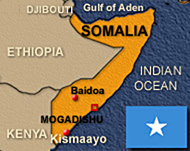Somali fighters to quit capital
Somali militias plan to withdraw hundreds of armed men from Mogadishu this week to boost security in the chaotic capital and persuade a fledgling government to base itself there, warlords have said.

An internal row over where to install President Abdullahi Yusuf’s government has exposed deepening power struggles within his troubled administration, which has worked from offices in Kenya since it was formed there at peace talks last year.
Three prominent warlords from the big Hawiye clan who also hold cabinet positions plan to pull out 85 battlewagons – flatbed trucks mounted with heavy machineguns or with anti-aircraft guns fired horizontally – and about 850 armed men from Mogadishu by Saturday, aides said on Wednesday.
“Preparations are under way to collect 85 technicals agreed from three sub-clans of the Hawiye,” said Ahmed Mohammed Dirie, spokesman for Osman Ali Ato, Muse Sudi Yalahow and Mohammed Qanyare, among the city’s strongest militia chiefs.
“The militias have until Saturday to collect the technicals and take the militiamen to four camps outside Mogadishu.”
Government toppled
Somalia collapsed into chaos after the overthrow of military ruler Mohammed Siad Barre in 1991. Conflict and famine have killed hundreds of thousands of people since then.
The United States and the European Union welcomed the plan to withdraw gunmen from Mogadishu and work to relocate the government there.
In a joint statement issued in Washington, the two major powers said: “The Somali reconciliation process is at a critical stage. There is an urgent need for a viable agreement on relocation and security.”
Ethiopia
Yusuf is a friend of Ethiopia, the region’s top military power, but he has no powerbase in Mogadishu. Many Somalis are hostile to what they see as attempts by their huge, nominally Christian-led neighbour to dictate events in the region.
 |
Members of Yusuf’s cabinet and a fledgling transitional parliament have been arguing for months about issues including where to base themselves once they go home.
A pro-Yusuf faction wants to be based temporarily in the towns of Baidoa and Jowhar, arguing the militia-infested capital Mogadishu is too dangerous. It also wants African Union peacekeepers to deploy to restore order and help the government, which has no revenues of its own, get established.
An anti-Yusuf faction of ministers who have their powerbases in Mogadishu say the government should go straight to the traditional capital. They dislike the idea of foreign troops and oppose Ethiopia contributing troops for such a force.
Muse Sudi, Osman Ato and Qanyare are prominent members of the latter faction, underlining their differences with Yusuf by working from Mogadishu while the president works from Nairobi.
Parliamentary session
In remarks to a session of parliament on Wednesday, Yusuf urged lawmakers to vote for a proposal by his followers authorising the government to relocate to Jowhar and Baidoa.
The session of 152 lawmakers voted for the deployment of an AU force of Ugandan and Sudanese troops, with 145 in favour and seven abstaining, a move that gives the government the authority to ask the AU to give its consent to the venture.
However, some observers questioned whether the vote carried credible political support because more than 100 members of the 275-strong body are currently in Somalia, many of them staying away from Nairobi as a protest against Yusuf’s policies.
The peace talks hosted by Kenya were marked by divisions between Ethiopia and Arab-backed African states wary of Ethiopia’s sway over the talks.